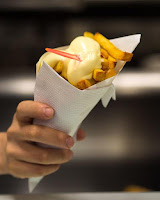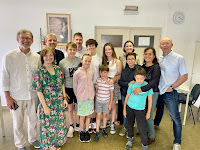Potatoes are a staple of many a diet, also in Europe. The Irish struggled through a potato famine. The Dutch and Germans have mashed potatoes as a main part of a meal. But it was the Belgians who developed the French fry. It was a French-speaking Belgian, but it was a Belgian.
In our area we call them “frieten” (free-tn). And although we definitely consider the Belgian “friet” to be superior to any other, we have to admit that the Dutch way of presenting them is amazing.
At the many small little wagons that sell snacks, or the snackbars in city and town, one can get frieten in a “puntzak” - a pointed sack. It isn’t actually a sack. It is a bit of heavy paper rolled up. A small child might do the same to make a trumpet or a hat. But turn it upside down and it is perfect for holding frieten!
A puntzak full of warm frieten topped with salt and perhaps your favorite sauce - which here would be mayonnaise - and eaten with a tiny plastic fork is the perfect little meal. If you want a full meal, you get a square paper basket of frieten topped with chopped meat and onions. But you have to sit down to eat that. The puntzak is mobile.




